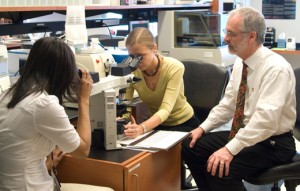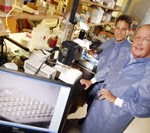Anthony Fauci, MD, director of the National Institute of Allergy and Infectious Diseases, delivered the keynote address Sunday, April 18, as part of a three-day conference on H1N1 Virus: The First Pandemic of the 21st Century, sponsored by the Emory-UGA Influenza Pathogenesis and Immunology Research Center.
One of the most important lessons from this past year’s pandemic, Fauci said, is the need to “connect the dots†between seasonal and pandemic influenza and not view them as two separate phenomena.
Fauci enthusiastically supports the CDC’s call for universal flu vaccination.
“Rather than trying to figure out one priority group over another,” Fauci said, “if we can get into a rhythm of getting most people vaccinated each year, we will have most of the population with some degree of immunity. We will get into a situation where we don’t need to go from a seasonal approach to a crisis approach.









